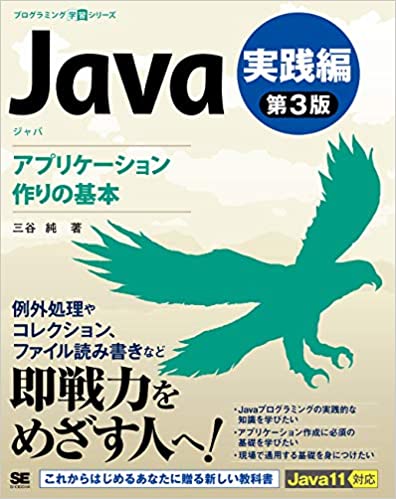Google App Engineプログラミング入門
Google App Engineプログラミング入門
Google App Engine上でStruts2.2を動かす場合には、
Struts2を単独で動かす場合よりも、いくつかの設定変更や、
対応が必要になります。
今回は、GAE(Google App Engine)上で、Twitter連携アプリの
サンプルをStruts2.2で作成してみました。
Twitter連携には、Twitter4Jというライブラリを利用しています。
開発環境は、Eclipse3.4.2
Struts2.2.1
Google App Engineは、1.3.8
GWT(Google Web Toolkit)は、2.1.0
Twitter4J 2.1.6
を利用しています。
パブリックタイムラインまたは、入力したIDのユーザタイムラインを表示します。
これらは全て認証の不要なAPIで作成可能になっています。
正常に稼働させるまでには、大きく2点障害がありました。
ローカル環境で、動作させるまでに必要な対応、
そしてデプロイ時のエラーを回避するための対応です。
1点目のローカル環境で動作させるまでの対応については、
先日のブログ記事で詳細を記述していますので、
そちらを参照してください。
※そしてさらに 追加でもう一点対応が必要になりました。
これは、<s:form action=”sample”></s:from>のタグで、
フォーム入力の画面を作成する場合にGAEではエラーが発生するようです。
原因の詳細は不明なのですが、実行時に以下のエラーが発生します。
java.lang.NoClassDefFoundError: javax.swing.tree.TreeNode is a restricted class. Please see the Google App Engine developer’s guide for more details.
対応方法は、上記で見つからないと言われるクラスをソースフォルダに定義する必要があるようです。
追加するクラスのソースを念のため、以下にも載せておきます。
/*
* Copyright (c) 2003 The Visigoth Software Society. All rights
* reserved.
*
* Redistribution and use in source and binary forms, with or without
* modification, are permitted provided that the following conditions
* are met:
*
* 1. Redistributions of source code must retain the above copyright
* notice, this list of conditions and the following disclaimer.
*
* 2. Redistributions in binary form must reproduce the above
copyright
* notice, this list of conditions and the following disclaimer in
* the documentation and/or other materials provided with the
* distribution.
*
* 3. The end-user documentation included with the redistribution, if
* any, must include the following acknowledgement:
* "This product includes software developed by the
* Visigoth Software Society (http://www.visigoths.org/)."
* Alternately, this acknowledgement may appear in the software
itself,
* if and wherever such third-party acknowledgements normally
appear.
*
* 4. Neither the name "FreeMarker", "Visigoth", nor any of the names
of the
* project contributors may be used to endorse or promote products
derived
* from this software without prior written permission. For written
* permission, please contact visigo...@visigoths.org.
*
* 5. Products derived from this software may not be called
"FreeMarker" or "Visigoth"
* nor may "FreeMarker" or "Visigoth" appear in their names
* without prior written permission of the Visigoth Software
Society.
*
* THIS SOFTWARE IS PROVIDED ``AS IS'' AND ANY EXPRESSED OR IMPLIED
* WARRANTIES, INCLUDING, BUT NOT LIMITED TO, THE IMPLIED WARRANTIES
* OF MERCHANTABILITY AND FITNESS FOR A PARTICULAR PURPOSE ARE
* DISCLAIMED. IN NO EVENT SHALL THE VISIGOTH SOFTWARE SOCIETY OR
* ITS CONTRIBUTORS BE LIABLE FOR ANY DIRECT, INDIRECT, INCIDENTAL,
* SPECIAL, EXEMPLARY, OR CONSEQUENTIAL DAMAGES (INCLUDING, BUT NOT
* LIMITED TO, PROCUREMENT OF SUBSTITUTE GOODS OR SERVICES; LOSS OF
* USE, DATA, OR PROFITS; OR BUSINESS INTERRUPTION) HOWEVER CAUSED AND
* ON ANY THEORY OF LIABILITY, WHETHER IN CONTRACT, STRICT LIABILITY,
* OR TORT (INCLUDING NEGLIGENCE OR OTHERWISE) ARISING IN ANY WAY OUT
* OF THE USE OF THIS SOFTWARE, EVEN IF ADVISED OF THE POSSIBILITY OF
* SUCH DAMAGE.
*
====================================================================
*
* This software consists of voluntary contributions made by many
* individuals on behalf of the Visigoth Software Society. For more
* information on the Visigoth Software Society, please see
* http://www.visigoths.org/
*/
package freemarker.core;
import java.io.IOException;
/**
* A TemplateElement representing a block of plain text.
*
* @version $Id: TextBlock.java,v 1.17 2004/01/06 17:06:42 szegedia Exp $
*/
public final class TextBlock extends TemplateElement {
private static final char[] EMPTY_CHAR_ARRAY = new char[0];
static final TextBlock EMPTY_BLOCK = new TextBlock(EMPTY_CHAR_ARRAY, false);
// We're using char[] instead of String for storing the text block because
// Writer.write(String) involves copying the String contents to a char[]
// using String.getChars(), and then calling Writer.write(char[]).By
// using Writer.write(char[]) directly, we avoid array copying on each
// write.
private char[] text;
private final boolean unparsed;
public TextBlock(String text) {
this(text, false);
}
public TextBlock(String text, boolean unparsed) {
this(text.toCharArray(), unparsed);
}
private TextBlock(char[] text, boolean unparsed) {
this.text = text;
this.unparsed = unparsed;
}
/**
* Simply outputs the text.
*/
public void accept(Environment env) throws IOException {
env.getOut().write(text);
}
public String getCanonicalForm() {
String text = new String(this.text);
if (unparsed) {
return "<#noparse>" + text + "</#noparse>";
}
return text;
}
public String getDescription() {
String s = new String(text).trim();
if (s.length() == 0) {
return "whitespace";
}
if (s.length() > 20) {
s = s.substring(0, 20) + "...";
s = s.replace('\n', ' ');
s = s.replace('\r', ' ');
}
return "text block (" + s + ")";
}
TemplateElement postParseCleanup(boolean stripWhitespace) {
if (text.length == 0)
return this;
int openingCharsToStrip = 0, trailingCharsToStrip = 0;
boolean deliberateLeftTrim = deliberateLeftTrim();
boolean deliberateRightTrim = deliberateRightTrim();
if (!stripWhitespace || text.length == 0) {
return this;
}
if (parent.parent == null && previousSibling() == null)
return this;
if (!deliberateLeftTrim) {
trailingCharsToStrip = trailingCharsToStrip();
}
if (!deliberateRightTrim) {
openingCharsToStrip = openingCharsToStrip();
}
if (openingCharsToStrip == 0 && trailingCharsToStrip == 0) {
return this;
}
this.text = substring(text, openingCharsToStrip, text.length
- trailingCharsToStrip);
if (openingCharsToStrip > 0) {
this.beginLine++;
this.beginColumn = 1;
}
if (trailingCharsToStrip > 0) {
this.endColumn = 0;
}
return this;
}
/**
* Scans forward the nodes on the same line to see whether there is a
* deliberate left trim in effect. Returns true if the left trim was
* present.
*/
private boolean deliberateLeftTrim() {
boolean result = false;
for (TemplateElement elem = this.nextTerminalNode(); elem != null
&& elem.beginLine == this.endLine; elem = elem
.nextTerminalNode()) {
if (elem instanceof TrimInstruction) {
TrimInstruction ti = (TrimInstruction) elem;
if (!ti.left && !ti.right) {
result = true;
}
if (ti.left) {
result = true;
int lastNewLineIndex = lastNewLineIndex();
if (lastNewLineIndex >= 0 || beginColumn == 1) {
char[] firstPart = substring(text, 0,
lastNewLineIndex + 1);
char[] lastLine = substring(text, 1 + lastNewLineIndex);
if (trim(lastLine).length == 0) {
this.text = firstPart;
this.endColumn = 0;
} else {
int i = 0;
while (Character.isWhitespace(lastLine[i])) {
i++;
}
char[] printablePart = substring(lastLine, i);
this.text = concat(firstPart, printablePart);
}
}
}
}
}
if (result) {
}
return result;
}
/**
* Checks for the presence of a t or rt directive on the same line. Returns
* true if the right trim directive was present.
*/
private boolean deliberateRightTrim() {
boolean result = false;
for (TemplateElement elem = this.prevTerminalNode(); elem != null
&& elem.endLine == this.beginLine; elem = elem
.prevTerminalNode()) {
if (elem instanceof TrimInstruction) {
TrimInstruction ti = (TrimInstruction) elem;
if (!ti.left && !ti.right) {
result = true;
}
if (ti.right) {
result = true;
int firstLineIndex = firstNewLineIndex() + 1;
if (firstLineIndex == 0) {
return false;
}
if (text.length > firstLineIndex
&& text[firstLineIndex - 1] == '\r'
&& text[firstLineIndex] == '\n') {
firstLineIndex++;
}
char[] trailingPart = substring(text, firstLineIndex);
char[] openingPart = substring(text, 0, firstLineIndex);
if (trim(openingPart).length == 0) {
this.text = trailingPart;
this.beginLine++;
this.beginColumn = 1;
} else {
int lastNonWS = openingPart.length - 1;
while (Character.isWhitespace(text[lastNonWS])) {
lastNonWS--;
}
char[] printablePart = substring(text, 0, lastNonWS + 1);
if (trim(trailingPart).length == 0) {
// THIS BLOCK IS HEINOUS! THERE MUST BE A BETTER
// WAY! REVISIT (JR)
boolean trimTrailingPart = true;
for (TemplateElement te = this.nextTerminalNode(); te != null
&& te.beginLine == this.endLine; te = te
.nextTerminalNode()) {
if (te.heedsOpeningWhitespace()) {
trimTrailingPart = false;
}
if (te instanceof TrimInstruction
&& ((TrimInstruction) te).left) {
trimTrailingPart = true;
break;
}
}
if (trimTrailingPart)
trailingPart = EMPTY_CHAR_ARRAY;
}
this.text = concat(printablePart, trailingPart);
}
}
}
}
return result;
}
/*
* private String leftTrim(String s) { int i =0; while (i<s.length()) { if * (!Character.isWhitespace(s.charAt(i))) break; ++i; } return * s.substring(i); } */ private int firstNewLineIndex() { String content = new String(text); int newlineIndex1 = content.indexOf('\n'); int newlineIndex2 = content.indexOf('\r'); int result = newlineIndex1 >= 0 ? newlineIndex1 : newlineIndex2;
if (newlineIndex1 >= 0 && newlineIndex2 >= 0) {
result = Math.min(newlineIndex1, newlineIndex2);
}
return result;
}
private int lastNewLineIndex() {
String content = new String(text);
return Math.max(content.lastIndexOf('\r'), content.lastIndexOf('\n'));
}
/**
* figures out how many opening whitespace characters to strip in the
* post-parse cleanup phase.
*/
private int openingCharsToStrip() {
int newlineIndex = firstNewLineIndex();
if (newlineIndex == -1 && beginColumn != 1) {
return 0;
}
++newlineIndex;
if (text.length > newlineIndex) {
if (newlineIndex > 0 && text[newlineIndex - 1] == '\r'
&& text[newlineIndex] == '\n') {
++newlineIndex;
}
}
if (new String(text).substring(0, newlineIndex).trim().length() > 0) {
return 0;
}
// We look at the preceding elements on the line to see if we should
// strip the opening newline and any whitespace preceding it.
for (TemplateElement elem = this.prevTerminalNode(); elem != null
&& elem.endLine == this.beginLine; elem = elem
.prevTerminalNode()) {
if (elem.heedsOpeningWhitespace()) {
return 0;
}
}
return newlineIndex;
}
/**
* figures out how many trailing whitespace characters to strip in the
* post-parse cleanup phase.
*/
private int trailingCharsToStrip() {
String content = new String(text);
int lastNewlineIndex = lastNewLineIndex();
if (lastNewlineIndex == -1 && beginColumn != 1) {
return 0;
}
String substring = content.substring(lastNewlineIndex + 1);
if (substring.trim().length() > 0) {
return 0;
}
// We look at the elements afterward on the same line to see if we
// should strip any whitespace after the last newline
for (TemplateElement elem = this.nextTerminalNode(); elem != null
&& elem.beginLine == this.endLine; elem = elem
.nextTerminalNode()) {
if (elem.heedsTrailingWhitespace()) {
return 0;
}
}
return substring.length();
}
boolean heedsTrailingWhitespace() {
if (isIgnorable()) {
return false;
}
for (int i = 0; i < text.length; i++) { char c = text[i]; if (c == '\n' || c == '\r') { return false; } if (!Character.isWhitespace(c)) { return true; } } return true; } boolean heedsOpeningWhitespace() { if (isIgnorable()) { return false; } for (int i = text.length - 1; i >= 0; i--) {
char c = text[i];
if (c == '\n' || c == '\r') {
return false;
}
if (!Character.isWhitespace(c)) {
return true;
}
}
return true;
}
boolean isIgnorable() {
if (text == null || text.length == 0) {
return true;
}
if (!isWhitespace()) {
return false;
}
// trick here
boolean atTopLevel = true;
TemplateElement prevSibling = previousSibling();
TemplateElement nextSibling = nextSibling();
return ((prevSibling == null && atTopLevel) || nonOutputtingType(prevSibling))
&& ((nextSibling == null && atTopLevel) || nonOutputtingType(nextSibling));
}
private boolean nonOutputtingType(TemplateElement element) {
return (element instanceof Macro || element instanceof Assignment
|| element instanceof AssignmentInstruction
|| element instanceof PropertySetting
|| element instanceof LibraryLoad || element instanceof Comment);
}
private static char[] substring(char[] c, int from, int to) {
char[] c2 = new char[to - from];
System.arraycopy(c, from, c2, 0, c2.length);
return c2;
}
private static char[] substring(char[] c, int from) {
return substring(c, from, c.length);
}
private static char[] trim(char[] c) {
if (c.length == 0) {
return c;
}
return new String(c).trim().toCharArray();
}
private static char[] concat(char[] c1, char[] c2) {
char[] c = new char[c1.length + c2.length];
System.arraycopy(c1, 0, c, 0, c1.length);
System.arraycopy(c2, 0, c, c1.length, c2.length);
return c;
}
boolean isWhitespace() {
return text == null || trim(text).length == 0;
}
次に、2点目ですが、ローカルでの実行に問題が無くても
デプロイ時に不明なエラーが発生しました。エラーの内容は、
こちらの内容を参照してください。
私の環境では、web.xml および、appengine-web.xml で、
ファイルがパース出来ないという意味合いのエラーの内容です。
Received IOException parsing the input stream for <該当のxmlファイルのパス>
上記のページでも最後の方で解決していますが、
結局のところ、該当のxmlファイル内のコメントを全て削除することで解決しました。
納得はいきませんが、とりあえず動作させる事を優先で対応しました。
以上で、やっと・・なんとか、
GAE+Struts2.2(Zero Configuration、Convention-Plugin)+Twitter連携アプリが
完成しました。
サンプルのアプリは、ここを参照してください。
Twitter連携用のAPIとしては、
Twitter4J#getPublicTimeline メソッド
Twitter4J# showUser メソッド
Twitter4J#showStatus メソッド
を利用しています(いずれも認証不要)
今後も、様々なTwitter連携APIのサンプルを作成してみたいと思います。








